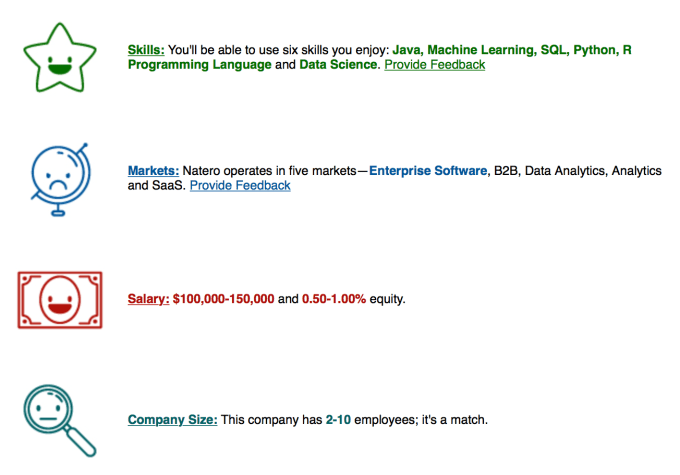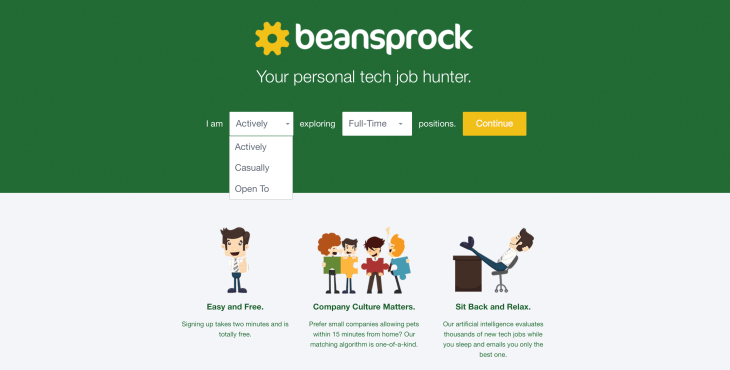When we think of employment, we think of jobs. We have job boards, job searches, and job listings, and yet what most of us actually care about when we change positions is the context of our new employment. Who will be our coworkers? What will the company be like? How large is it? What will be our role?
To answer those sorts of questions, Cameron Levy and Dustin Smith today launched Beansprock, a machine learning-based job search platform that they hope will transform job hunting into company hunting. “The idea is not just to go out and find a role that you are going to love, but rather find companies that are working on problems that you are going to love,” Levy explains.
To do that, you fill out a short questionnaire on Beansprock about your skills, indicating which skills are your strengths and also which ones you would actually like to use on your next job. Then, the company starts to match you up to companies that might be interesting by sending you curated emails as frequently as you would like.

An example of the curated email that Beansprock sends to users
Those emails are designed to show you not just which skills you have that might be useful to the company, but also the context of the company, such as its size. Over time, the company intends to add more factors, such as the level of freedom at a company (some companies block certain websites, for instance) as well as the company’s culture. Through the product’s mobile web interface, users can swipe on various skills and soft factors, teaching Beansprock which you like and which you don’t.
The front-end interface is pretty simple today, but it’s the technology behind the scenes that sets Beansprock apart from other job boards and resume services. The team confronted two challenges. First, how do they identify a match between your skills and a particular position without resorting to keyword searches like competitors. Second, how should they rank relevant jobs for the user.
Smith, the Chief Technology Officer and a graduate of MIT’s Media Lab, developed a hierarchical knowledge map of all job titles and skills to determine the right matches. That map allows their software to know that certain programming languages like JavaScript are more likely to be associated with front-end engineering while other languages like Go are more likely to be associated with backend engineering.
Knowing a user’s skills and how those skills actually translate to real positions, Beansprock is then able to predict which jobs are a match and which ones won’t be. Smith argues that “By having this structure behind it, we can reason about the skills themselves. If we know that someone knows front-end programming skills, that is a really high-level skill,” and the product can make assumptions about what the user’s abilities are.
Ranking the matches then becomes the next challenge. Most job boards simply provide a couple of sorting mechanisms, such as popularity or salary. Smith and Levy wanted to allow every user to have their own weights on different factors, since everyone has different preferences when it comes to their jobs.
By swiping online and providing feedback through their match email, Beansprock is able to learn about the values of its users. Smith believes this is critical. “The most unique aspect of our recommendation is that we aren’t just giving a ranked list, but rather we are giving it for specific reasons. Our users can then give us feedback on these specific reasons and they have a lot of control over the recommendation.”
Smith and Levy were connected through a mutual friend while at MIT, where Smith was at the Media Lab and Levy was a student at the Sloan School of Management. Originally, they had built a product centered around career guidance. “We noticed that our classmates were just as unclear about what they wanted to do as undergraduates,” Levy says. However, users kept concentrating on one feature of the product, which they later decided to expand into this version of Beansprock.
They hope to monetize the product by adding employer-centric features that will allow hiring managers to seek out workers that might be interested in them. “If you are a company looking for software developers, you just don’t want to match on skill sets, you are looking for culture fit as well. Since users tell Beansprock what they are looking for, we can help employers find people,” Levy says. The hope is that the monetization actually helps to improve the product for everyone since greater information will mean better matches.
Beansprock received a small amount of seed funding from the E14 Fund, an investment fund that targets students coming out of MIT’s Media Lab. The founders hope to start generating revenue as early as this year as the employer features are launched.
Today, the product is mostly centered on the tech industry in San Francisco, Boston and New York City, where specific skills are critically important to matching. The company is processing tens of thousands of job postings every day. Over time, the founders hope to expand the range of their searches to include a greater number of non-technical jobs across the United States.
As employment rebounds in the U.S., more and more workers will start to transition from the jobs they held throughout the recession to new jobs more in line with their career goals. Through Beansprock, they might just have an easier time parsing not only job postings, but the kind of employers they would enjoy working for.
